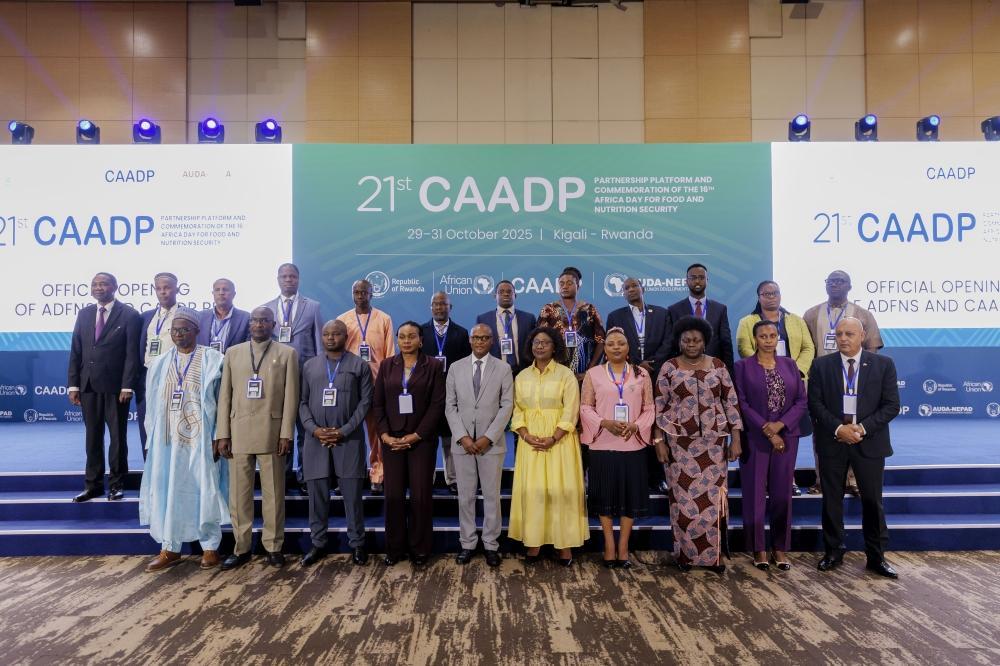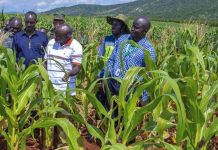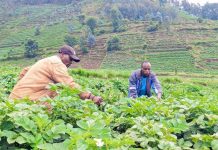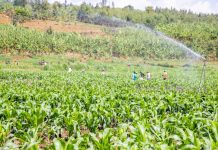Africa-Press – Rwanda. Implementing the Comprehensive Africa Agriculture Development Programme (CAADP) Strategy and Action Plan running from 2026 to 2035 will require up to $100 billion to drive Africa’s agricultural transformation.
The need was discussed during the 21st Comprehensive Africa Agriculture Development Programme Partnership Platform (CAADP-PP) and the 16th Africa Day for Food and Nutrition Security (ADFNS) held from October 29 to 31, in Kigali.
AGRA’s Vice President for the Center of Technical Expertise
The CAADP Strategy and Action Plan, adopted by an Extraordinary Summit of the African Union (AU) in Kampala in January 2025, builds on two decades of progress in agricultural growth, poverty reduction, and food security.
The accompanying Kampala CAADP Declaration on Building Resilient and Sustainable Agrifood Systems in Africa sets out a 10-year plan with six commitments and 35 intervention areas.
As the continent enters a decisive phase of food systems reform, the Alliance for a Green Revolution in Africa (AGRA) reaffirmed its commitment to supporting African governments and institutions in delivering on their agricultural transformation promises.
Participating in the Kigali forum, which was co-organized by the AU Commission and AUDA-NEPAD, the AGRA delegation stressed the need to shift from commitments to coordinated delivery anchored in Africa’s own priorities and leadership.
This year’s CAADP-PP saw AGRA and partners align around top priorities driving tangible outcomes in Africa’s agrifood systems.
During the forum, AGRA presented the Africa Food Systems Report (AFSR) 2025, which provides indicators to track progress across supply chains, diets, food environments, and outcomes.
“The CAADP Partnership Platform is where partners align on what we will deliver together,” Jonathan Said, Vice President for Technical Expertise at AGRA, said.
“Our role is to support the AUC and AUDA-NEPAD in ensuring partner coherence and focus on key priorities such as food corridors, end-to-end value chain development, and seed system commercialisation. This will enable countries to implement their National Agriculture Investment Plans faster, attract private investment, and expand access to finance for farmers and SMEs.”
The shared commitments focused on providing tangible support for governments to strengthen coordination and delivery of flagship agricultural programs and policies that drive food systems transformation.
Another priority agreed upon was advancing regional trade integration while supporting the private sector to invest in value addition and market access.
“AGRA’s initiatives are designed to connect smallholder farmers to regional markets, de-risk investment in agro-processing, and mobilize new financing models that catalyze growth along entire value chains—toward Africa’s self-sufficiency and inclusive agricultural growth,” Said noted.
Partners also pledged to accelerate the African Soil Health and Fertilizer Agenda, recognizing that soil degradation remains a major barrier to food security.
Efforts are underway to promote integrated soil fertility management, efficient fertilizer use, and farmer-centred extension systems to improve access to knowledge and inputs.
The forum also agreed to fast-track the AU’s Seed and Biotechnology Action Plan, emphasising the commercialisation and adoption of climate-smart, high-yielding, and nutrient-dense seeds and technologies.
Through its Centre of Excellence for Seed Systems in Africa, AGRA showcased a tri-partite model linking AGRA, One CGIAR, and National Agricultural Research Systems to develop and deploy climate-resilient, nutrient-dense crop varieties.
Renewed emphasis was also placed on empowering youth and women as key drivers of Africa’s food systems transformation.
Recognising their central role in agriculture, AGRA is promoting targeted programmes that expand access to finance, land, and agribusiness skills.
The African Union Commission also convened a side event focusing on tracking youth entrepreneurship and employment in agrifood systems, noting that many countries still lack coherent metrics to measure progress and direct financing effectively toward viable youth-led enterprises.
The three-day high-level gathering in Kigali marked a pivotal transition from the 2014 Malabo Declaration to the Kampala CAADP Strategy and Ten-Year Action Plan, setting an ambitious agenda for the next decade.
Minister of Agriculture and Animal Resources, Mark Cyubahiro Bagabe
Mark Cyubahiro Bagabe, Rwanda’s Minister of Agriculture and Animal Resources, urged partners to move beyond pledges toward tangible action, stressing that Africa’s transformation must be driven by Africans through partnership, innovation, and collective purpose.
“Implementing the CAADP strategy will require achieving the Kampala target of mobilising $100 billion by 2035,” Bagabe said.
“This demands bold, blended financing that effectively combines public, private, and climate-focused investments.”
The meeting served as a platform to galvanize continental support for the Kampala Declaration, described as more than a policy document—it is a commitment to build resilient, inclusive, and sustainable agrifood systems that deliver zero hunger, equitable livelihoods, and environmental sustainability by 2035.
Estherine Fotabong, Director of Agriculture, Food Security and Environmental Sustainability at AUDA-NEPAD, underscored the shift from mere commitments to measurable transformation.
“The Kampala Declaration must be about delivery and transformation—measured in hectares restored, markets expanded, youth employed, and communities nourished,” she said.
Moses Vilakati, AU Commissioner for Agriculture, Rural Development, Blue Economy, and Sustainable Environment, said: “Ending hunger and malnutrition is not just a development priority but a matter of justice and dignity. True reparative justice must also mean reclaiming control over our food systems, restoring the dignity of farmers, and creating fairer trade and investment pathways.”
He added that the new strategy represents a strategic imperative for Africa to build sovereign and resilient food systems, including protecting agricultural biodiversity and revitalising indigenous crops to strengthen resilience against climate shocks.
For More News And Analysis About Rwanda Follow Africa-Press








